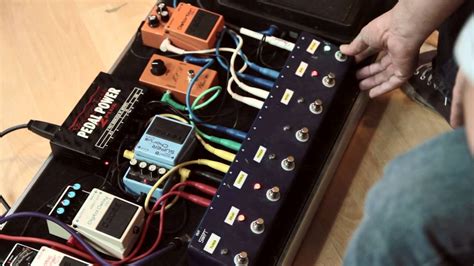Before you dive headfirst into the exciting world of secondhand effects pedals, it’s crucial to do your due diligence and ask the right questions to ensure you’re making an informed purchase. Whether you’re a seasoned pro or a curious newbie, this comprehensive guide will provide you with the essential questions to ask before handing over your hard-earned cash.

Conditions and History
- Current Condition: Ask the seller about the board’s overall condition, including any visible scratches, dents, or other cosmetic imperfections.
- Functioning: Inquire about the functionality of each pedal, knob, and switch. Ensure that everything works as intended and there are no intermittent issues.
- Maintenance: Find out if the board has undergone any maintenance or repairs in the past, such as pedal swaps, re-wiring, or cleaning.
- Previous Owner: Ask about the previous owner’s usage habits and whether they were a gigging musician or hobbyist. This can give you an idea of the board’s wear and tear.
Specifications and Features
- Power Supply: Determine the power supply requirements of the board and whether it comes with an adapter or not.
- Input and Output Jacks: Check the number and type of input and output jacks on the board to ensure compatibility with your other gear.
- Pedal Layout: Examine the pedal layout and make sure it fits your playing style and pedal preferences. Consider the size and arrangement of the pedals.
- Additional Features: Inquire about any additional features, such as built-in effects loops, MIDI capabilities, or a tuner.
Accessories and Documentation
- Carrying Case: Find out if a carrying case or bag is included with the board. This is essential for protecting the board during transport.
- Manuals: Ask for any manuals or documentation that came with the pedals and the board itself. This can be invaluable for troubleshooting or understanding the board’s features.
- Warranty: Determine if the board is still under warranty and if any service agreements are available.
Pricing and Logistics
- Price: Compare the asking price to the market value of similar boards and pedals to ensure you’re getting a fair deal.
- Payment: Clarify the payment options accepted by the seller and any potential delivery or handling fees.
- Shipping: If shipping is required, find out the estimated delivery time, packaging details, and any associated costs.
Additional Considerations
- Authenticity: If purchasing online or from an unfamiliar seller, ask for proof of authenticity to verify the board’s genuineness.
- Negotiation: Be prepared to negotiate with the seller within reason. Consider the board’s condition, features, and accessories when making an offer.
- Personal Inspection: If possible, arrange a time to personally inspect the board before purchasing. This allows you to assess its condition firsthand.
- Trust Your Instincts: Ultimately, trust your instincts. If something about the deal doesn’t feel right, it’s best to walk away.
Why It Matters
Purchasing a used effects board can offer several benefits:
- Cost Savings: Used effects boards can be significantly cheaper than purchasing new ones, allowing you to save money.
- Vintage Finds: You may find rare or discontinued pedals on used boards that are no longer available new.
- Customizability: Used boards provide an opportunity to build a custom pedalboard tailored to your specific needs.
- Environmental Sustainability: Buying used gear extends the lifespan of products and reduces waste.
Tips for Success
- Do Your Research: Gather information about the specific board and pedals you’re interested in before making inquiries.
- Ask Specific Questions: Avoid vague questions. Instead, ask targeted questions to get the most detailed information.
- Be Patient: Purchasing a used effects board can take time. Don’t rush into a decision without considering all your options.
- Follow Up: If you have any unanswered questions or concerns, don’t hesitate to follow up with the seller.
Conclusion
By asking the right questions and following the tips in this guide, you’ll be well-equipped to make an informed decision when purchasing a used effects board. Remember to consider the condition, features, accessories, pricing, and logistics to ensure you find the perfect board for your needs while saving money and supporting the used gear market.
